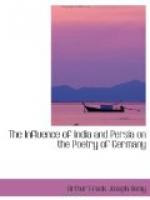Und so will ich, ein fuer
allemal,
Keine Bestien in dem Goettersaal!
Die leidigen Elephantenruessel,
Das umgeschlungene Schlangengenuessel,
Tief Urschildkroet’
im Weltensumpf,
Viel Koenigskoepf’ auf
einem Rumpf,
Die muessen uns zur Verzweiflung
bringen,
Wird sie nicht reiner Ost
verschlingen.[98]
Goethe classed Indic antiquities with those of Egypt and China, and his attitude towards the question of their value is distinctly expressed in one of his prose proverbs: “Chinesische, Indische, Aegyptische Altertuemer sind immer nur Curiositaeten: es ist sehr wohl gethan, sich und die Welt damit bekannt zu machen; zu sittlicher und aesthetischer Bildung aber werden sie uns wenig fruchten."[99]
After all, Goethe’s Orient did not extend beyond the Indus. It was confined mainly to Persia and Arabia, with an occasional excursion into Turkey.
To this Orient he turned at the time of Germany’s deepest political degradation, when the best part of its soil was overrun by a foreign invader, and when the whole nation nerved itself for the life and death struggle that was to break its chains. The aged poet shrank from the tumult and strife about him and took refuge in the East. The opening lines of the first Divan poem express the motive of this poetical Hegire.
The history of the composition of the Divan is too well known to require repetition. It is given with great detail in the editions prepared by von Loeper and Duentzer.[100] Suffice it to say that the direct impulse to the composition of the work was the appearance, in 1812, of the first complete version of Persia’s greatest lyric poet Hafid, by the famous Viennese Orientalist von Hammer. The bulk of the poems were written between the years 1814 and 1819,[101] although in the work as we now have it a number of poems are included which arose later than 1819 and were added to the editions of 1827 and 1837.[102]
The idea of dividing the collection into books was suggested by the fact that two of Hafid’s longer poems bear the titles [Arabic] i.e. “book of the cup-bearer” and “book of the minstrel,” as well as by the seven-fold division which Sir William Jones had made of Oriental poetry.[103] For the heroic there was no material, nor were some of the other divisions suitable for Goethe’s purpose. So only the Buch der Liebe and the Buch des Unmuts (to correspond to satire) could be formed. Other books were formed in an analogous manner until they were twelve in number. The poet originally intended to make them of equal length, but this intention he never carried out, and so they are of very unequal extent, the longest being that of Suleika (53 poems) and the shortest those of Timur and of the Parsi (two poems each).
The great majority of the Divan-poems are not in any sense translations or reproductions, but entirely original compositions inspired by the poet’s Oriental reading and study. The thoroughness and earnestness of these studies is attested by the explanatory notes which were added to the Divan and were published with it in 1819,[104] and which show conclusively, that, although Goethe could not read Persian poetry in the original, he nevertheless succeeded admirably in entering into its spirit.




